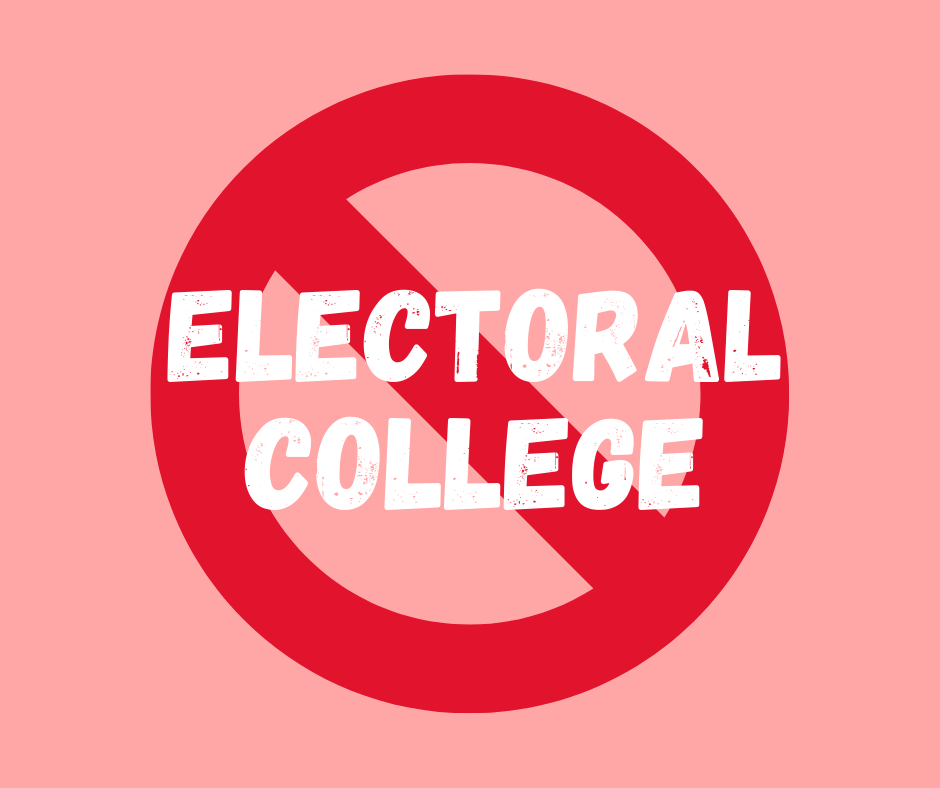OPINION: The Electoral College should be abolished

The Electoral College has aided in presidential elections since 1804, when the American government was first being established. Now, there seems to be little need for it.
The Electoral College has 538 members and will vote on the current presidential candidates Dec. 14. Each state has its own electors that vote based on either the “winner-takes-all” or “district” system.
The winner-takes-all system is established in 48 states and requires that all of the state’s electoral votes be allocated to the presidential candidate who wins such state. The district system, which is established in only Maine and Nebraska, is where the winner of a congressional district gets one vote from each district, then the other two votes are given to the candidate who was voted for most statewide, according to the National Conference of State Legislature.
Abolishment of the Electoral College is often discussed due to the fact that it commonly deters voters and alters popular election results.
One of the main arguments against the Electoral College is that it can cause the loser of the popular vote to win the entire election, which occurred in 2016. Former Secretary of State Hillary Clinton won the national popular vote by 2.9 million votes, according to CNN, but President Donald Trump won the electoral vote.
This process is illogical. If the majority of voters chose Clinton over Trump, it should only make sense for Clinton to be inaugurated into the White House.
This process also forces many voters to feel irrelevant, especially due to the winner-takes-all system. Many voters in Florida, for example, voted blue this election. Since Trump won a majority of the state, though, all 29 electoral votes will be cast in his favor, making the votes for President-elect Joe Biden a non-factor in the final election results.
A similar argument is made by those who oppose the elimination of the Electoral College, claiming that voters in rural areas of the country have less of a chance of being represented by the popular vote. But if those in rural areas are overpowered by those in urban areas, that is just democracy in the works because the majority of Americans elect the president.
Voter turnout was at a record high this election, according to The Washington Post, but many citizens still opted out of casting a ballot. A 2018 UF election projection found that most presidential elections before 2020 had only about 50-60% turnout. This is because many felt that their vote was unimportant and lacking influence, according to the 100 Million Project, a survey of 13,000 non-voters to better understand how the voting system can be improved.
A constituency that feels as if they have no impact on the results is undemocratic.
The establishment of the Electoral College also affects the campaign trail and governance. Candidates are far more likely to campaign in swing states where their rallies and speeches could truly influence the election, as opposed to states like California and Texas which typically stay “blue” or “red,” respectively.
Governance is affected when a policy that an incumbent president is attempting to change or create affects a state that determines an election. A policy change that angers supporters in swing states could cost the candidate re-election, which deters them from making that alteration.
The Electoral College is undemocratic and should be abolished. It transforms election results, making many citizens feel as if they have no voice. It also forces candidates to work only as a means of gaining votes from swing states and not as a means of changing America for the better.
Instead, the popular vote should be the deciding factor. Called the National Popular Vote initiative, this system would allow all votes to be just as influential as the last and create an equal playing field for all parts of the country. The initiative began after the 2000 presidential election, where former President George W. Bush won the electoral vote despite losing the popular.
So far, four presidential candidates have lost the electoral vote after winning the popular vote, according to the Associated Press, which shows how reliable a direct popular vote system would be. The National Popular Vote has been introduced to every state legislature and was endorsed by the American Civil Liberties Union.
A pledge for states to allocate their electoral votes to the winner of the popular vote in their state has been signed by 15 states plus D.C., which will hopefully lead to the elimination of the Electoral College, but it will take a lot of work to truly be abolished.
A national popular vote would require an amendment change, since the Electoral College is written in the Constitution. But if Americans fight hard enough, a two-thirds vote by the House of Representatives and the Senate and three-fourths of the states would be enough to change the election process.
With enough hard work, Americans have the ability to establish a more beneficial democracy. By establishing a better form of self-governance, we are ensuring that we more strongly influence elections and make our voices even louder.







